When you need to decline food, first express gratitude for the offer. Acknowledge the thoughtfulness behind it. You can then gently explain your reason, whether it's dietary preferences or just not being hungry. Use humor to lighten the mood, and if appropriate, suggest an alternative way to connect, like sharing a recipe. Pay attention to your body language; maintain eye contact and smile to convey warmth. Timing is key, so respond promptly. Following up with appreciation reinforces your relationship and keeps the interaction positive. For more effective strategies, you might discover helpful tips ahead.
Key Takeaways
- Express genuine gratitude for the offer to acknowledge the kindness behind it before politely declining.
- Use humor or light-hearted banter to ease any potential awkwardness when saying no.
- Maintain a warm and friendly tone while clearly stating your reasons for declining.
- Respond promptly to the offer, ideally before food is served or during a break in conversation.
- Follow up with compliments about the person's cooking and suggest alternative ways to connect in the future.
Understanding Your Reasons
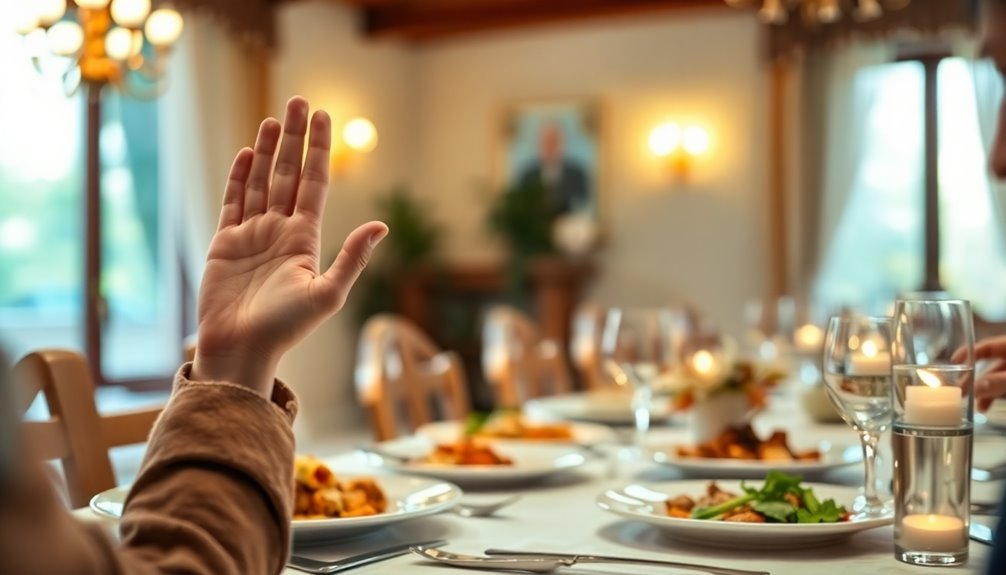
Understanding your reasons for declining food is pivotal, as it can help you communicate your intentions clearly and respectfully. When you reflect on your motivations, whether they're health-related, dietary restrictions, or simply personal preference, you empower yourself to express your boundaries in a way that fosters understanding.
By articulating your reasons, you're not only respecting your needs but also engaging in respectful communication with others. This approach encourages a dialogue that can enhance relationships rather than create discomfort.
For instance, if you're avoiding certain foods for health reasons, sharing that information can clarify your position, allowing others to appreciate your choices rather than taking them personally.
Establishing personal boundaries is vital for maintaining your well-being. When you know why you're declining, it makes it easier to stand firm in your decision, even in social situations where pressure to indulge might arise.
You have the right to prioritize your health and preferences, and doing so can inspire others to respect their own boundaries as well.
Ultimately, understanding your reasons sets the stage for genuine interactions. It's about creating an environment where everyone feels comfortable and accepted. By being clear and respectful in your communication, you invite others to embrace your choices without judgment, fostering a sense of belonging in any social setting.
Expressing Gratitude First
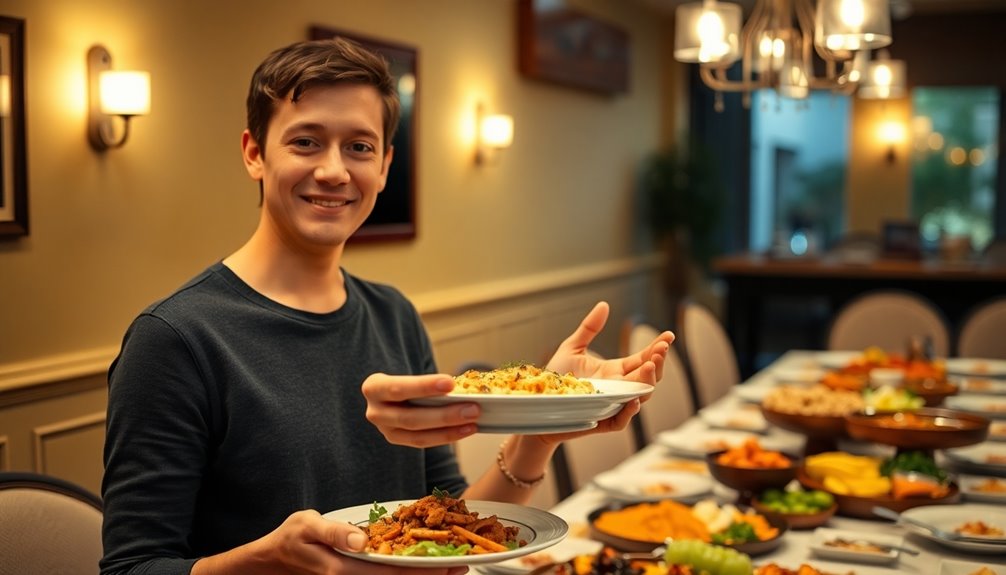
Often, expressing gratitude first can set a positive tone when you need to decline food. When someone offers you a dish, it's not just about the food itself; it's also about the thought and effort behind it. A gracious response begins with acknowledging this intention.
You might say, "Thank you so much for offering me this. I truly appreciate the time and care you've put into preparing it." By doing this, you're showing genuine appreciation for their gesture before addressing your decision.
After expressing your gratitude, you can gently decline the offer. It's best to keep your tone warm and friendly, ensuring the other person feels valued.
You could say, "I'm really grateful, but I'm going to pass for now. I'm trying to be mindful of what I eat today." This way, you're being honest about your situation without diminishing the kindness of their offer.
Using Humor to Lighten the Mood

Acknowledging the effort behind a food offer is important, but you can also use humor to ease any potential awkwardness when you need to decline. Humor can act as a social lubricant, making the interaction more enjoyable for everyone involved. Think of it as a little bit of improv comedy—you're responding in the moment and keeping the atmosphere light.
Here's a handy table to inspire your witty banter:
| Situation | Humor Example | Response Type |
|---|---|---|
| You're offered dessert | "I'd love to, but my waistband just filed a restraining order!" | Light-hearted |
| Someone insists you try their dish | "If I had a nickel for every time I said yes, I could've bought my own!" | Playful |
| A friend offers seconds | "I'm saving room for my next food adventure—it's a tough job!" | Humorous exaggeration |
| A colleague brings in snacks | "I'd join you, but I'm on a strict 'no deliciousness' diet!" | Funny but polite |
Using humor in these situations can break the ice and show appreciation for the offer while gently declining. Remember, the goal is to maintain a sense of belonging. When you incorporate witty banter, you're not just saying "no"—you're engaging in a way that fosters camaraderie. So, the next time you need to pass on food, don't be afraid to let your humorous side shine!
Offering a Simple Explanation

Offering a simple explanation when refusing food can help maintain a positive atmosphere and avoid misunderstandings. When someone offers you food, it's perfectly acceptable to provide a brief reason for your decision. This approach not only clarifies your stance but also shows respect for the person's gesture.
Using assertive responses can empower you to express your feelings clearly. Instead of saying, "I can't eat that," consider a more informative response, like, "I appreciate the offer, but I'm currently following a specific diet." This way, you acknowledge their kindness while providing a polite excuse that explains your choice without sounding dismissive.
It's important to keep your explanation concise. You don't need to delve into intricate details. A simple statement about dietary restrictions, personal preferences, or even being full can suffice. For instance, you might say, "Thank you, but I just had a big lunch," or "I really appreciate it, but I'm allergic to that ingredient." These comments not only serve as polite excuses but also foster a sense of understanding.
Remember that declining food doesn't have to feel awkward. By offering a simple explanation, you're reinforcing your boundaries while maintaining a warm connection. This respectful communication encourages a supportive environment where everyone feels comfortable sharing their food preferences. Ultimately, clear and polite explanations help you navigate food situations with grace and confidence, allowing you to enjoy the company of others without compromising your choices.
Suggesting an Alternative
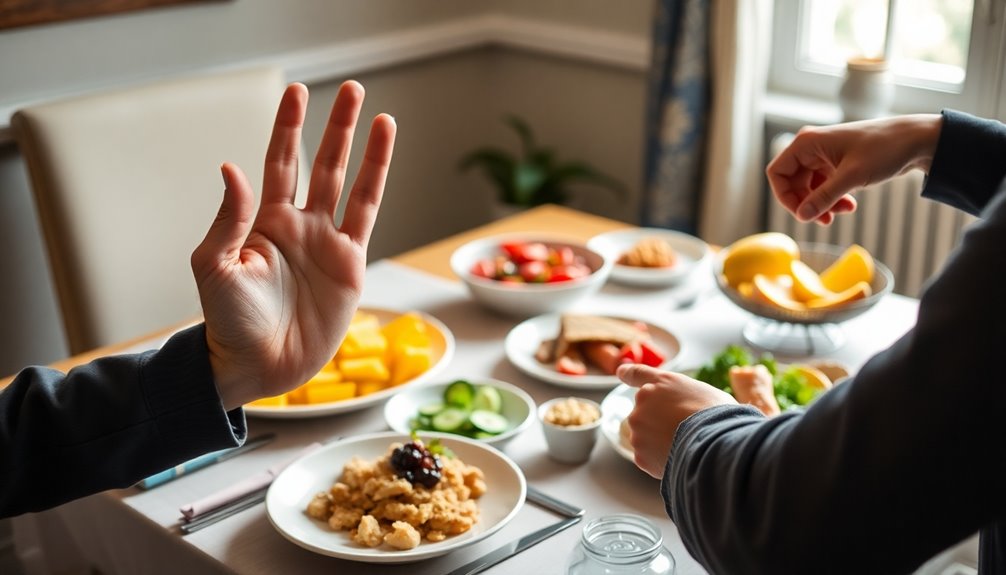
To sum up, by suggesting alternatives when declining food, you not only maintain your own dietary integrity but also enhance the experience for everyone involved.
This simple yet effective approach can transform what could be an awkward moment into an opportunity for connection.
Non-Verbal Cues for Declining

When maneuvering social situations where food is offered, non-verbal cues can speak volumes. Your body language often conveys your feelings before you even say a word. To politely decline food, you can utilize subtle gestures to communicate your intentions without creating discomfort. For instance, a gentle shake of your head, combined with a warm smile, can effectively indicate your choice without sounding harsh.
Additionally, maintaining polite body language is essential. Instead of crossing your arms or turning away, keep an open posture. This approach signals that you appreciate the offer while also gently declining it. You might also place your hands in a relaxed position, which conveys receptiveness and gratitude for the gesture.
Eye contact can reinforce your message, showing that you value the person's kindness even as you decline. Nodding while expressing thanks can further enhance your non-verbal communication, making it clear that you're grateful but not interested in the food being offered.
Remember, your facial expressions can also convey your feelings. A slight frown or raised eyebrows might suggest discomfort, so instead, focus on softening your expressions. A slight smile can show warmth, fostering connection despite the decline.
Ultimately, mastering these non-verbal cues allows you to navigate food offerings gracefully. By employing subtle gestures and polite body language, you can maintain harmonious social interactions while respecting your own choices.
Timing Your Decline Appropriately
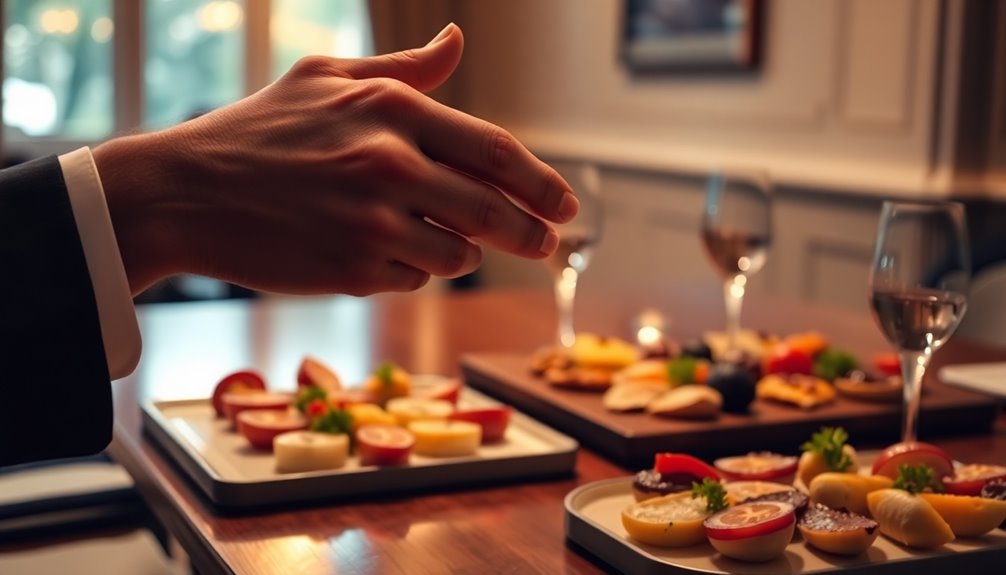
Timing is important when it comes to declining food offers, as it can greatly influence the tone of the interaction. You want to make sure that your decline feels respectful and considerate, rather than abrupt or dismissive. Pay attention to the social cues and body language of those around you. If someone is offering food with enthusiasm, it's best to respond promptly and kindly, showing appreciation for their gesture while still declining.
Here's a table to help you understand the best timing for your decline:
| Situation | Best Timing | Body Language Tips |
|---|---|---|
| During the Offer | Respond right away | Smile and maintain eye contact |
| When Everyone's Eating | Wait for a break | Nod to acknowledge |
| At a Gathering | Decline prior to serving | Stand with open posture |
| One-on-One Conversation | Respond quickly | Lean slightly forward |
| After a Second Offer | Decline gently | Use a reassuring gesture |
In essence, your timing can improve the overall experience for both you and the person offering food. By being mindful of your surroundings and responding to social cues, you can navigate these situations with grace. Remember, your body language plays an important role; it should convey warmth and appreciation even as you politely decline. With practice, you'll find the right moments to decline without feeling awkward or out of place, fostering a sense of belonging in every social gathering.
Practicing Assertiveness

Practicing assertiveness is vital to effectively declining food offers without feeling guilty or awkward. By honing your ability to express your needs politely yet firmly, you can navigate social situations with greater ease. Assertiveness training can be an invaluable tool in this respect, helping you develop the skills to communicate your preferences clearly.
Start by acknowledging your feelings and needs. When someone offers you food, take a moment to assess whether you truly want it or not. If you decide to decline, do so with confidence.
You might say, "Thank you so much for the offer, but I'll pass this time." This simple response not only conveys your decision but also shows gratitude, fostering a positive atmosphere.
Confidence building plays a pivotal role in practicing assertiveness. The more comfortable you feel in your own skin, the easier it becomes to state your preferences. Consider role-playing scenarios with a trusted friend.
This practice can help you internalize your responses, making it feel more natural when the situation arises. Remember, it's perfectly acceptable to prioritize your own comfort and well-being.
Lastly, remind yourself that asserting your boundaries isn't selfish; it's a sign of self-respect. By practicing assertiveness, you create a space where your needs matter, and you empower others to respect those boundaries as well.
Embrace this journey, and you'll find that declining food offers becomes a seamless part of your interactions.
Following up With Appreciation
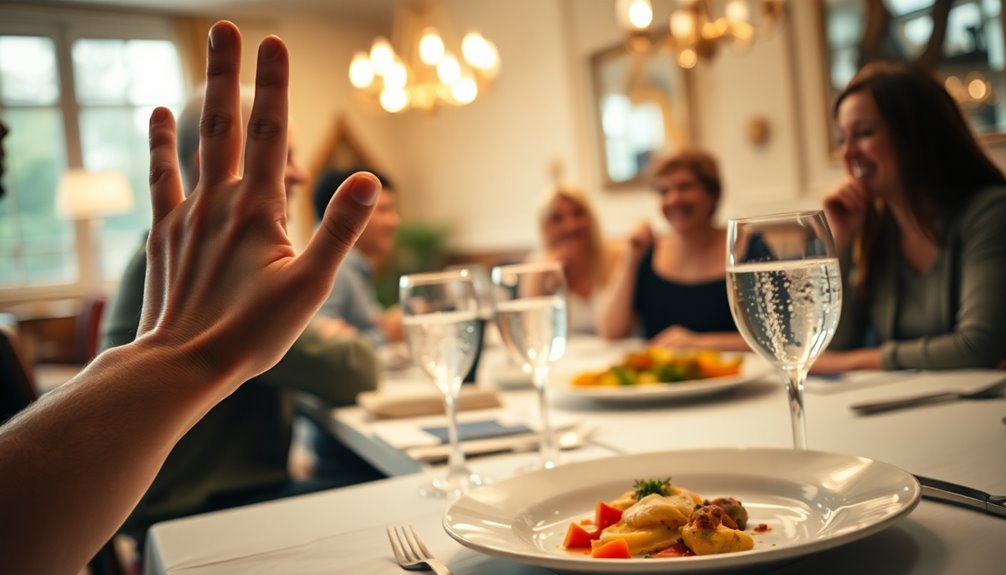
A thoughtful follow-up after declining food can strengthen your relationships and show appreciation for the gesture. When you politely decline an offer, expressing your gratitude afterward becomes crucial. This not only reflects your gracious response but also reinforces the connection you share with the person who offered.
Consider sending a quick message or having a brief conversation to convey your genuine thankfulness. You might say something like, "I really appreciate your kind offer. It means a lot to me that you thought of me." This acknowledges their effort and leaves a positive impression.
If you know that the person takes pride in their cooking or baking, you could add a compliment about their skills. For instance, "I've heard so much about your delectable lasagna; I can't wait to try it next time!" This not only shows appreciation but also opens the door for future interactions, making them feel valued and respected.
Additionally, consider suggesting an alternative way to connect. Propose meeting for coffee or sharing a meal at a later date. This gesture creates opportunities for bonding and demonstrates that you genuinely want to spend time together, despite not being able to accept their food offer at that moment.
Frequently Asked Questions
What if I'm Allergic to the Food Offered?
If you're allergic to the food offered, it's perfectly okay to express that. You can use a medical excuse to politely refuse, saying something like, "I appreciate the offer, but I can't eat that due to an allergy." This shows gratitude while ensuring your safety.
You might also suggest alternative options, like, "Is there something else available?" This approach maintains a sense of belonging while prioritizing your health.
How Do I Decline Without Offending the Host?
Imagine you're at a dinner party, and a friend offers you their famous lasagna. To avoid offending them, you can practice a grateful refusal.
Smile and say, "Thank you so much! That looks amazing, but I'm really full from earlier." This shows appreciation while providing a polite alternative to accepting.
Can I Say No if I'm on a Diet?
Yes, you can say no if you're on a diet. It's important to prioritize your health and goals. You might explain your meal prep strategies and how they help you handle cravings. Sharing that you're focusing on your dietary choices can foster understanding. Most people appreciate honesty and respect your commitment. Remember, it's okay to decline politely, and you can still enjoy the company without compromising your dietary needs.
Is It Rude to Decline Food at a Cultural Event?
In today's world, where cultural sensitivity matters more than ever, it's important to navigate social norms with grace.
Declining food at a cultural event isn't inherently rude; it often depends on how you express your dietary restrictions. Acknowledging hospitality boundaries can help ease the situation.
Politely explaining your reasons shows respect for the host's efforts while maintaining your comfort. Remember, it's about balance—honoring traditions while staying true to your needs.
What if I Feel Pressured to Eat?
When you feel pressured to eat, it's important to recognize that peer pressure and social norms can influence your choices. You're not alone in this; many feel the same way. Remember, your comfort matters.
Politely express your gratitude and share that you're not hungry at the moment. Most people will understand and respect your decision.
Prioritizing your own needs doesn't diminish your desire for belonging; it reinforces your authenticity in social situations.
Conclusion
To sum up, declining food doesn't have to be an awkward experience. By understanding your reasons, expressing gratitude, and using humor, you can navigate these moments with ease. Remember, it's not rocket science—just a simple conversation. With practice, you'll handle these situations like a pro, ensuring your relationships remain strong and respectful. So, next time you need to decline, do it confidently and follow up with appreciation to leave a positive impression.



